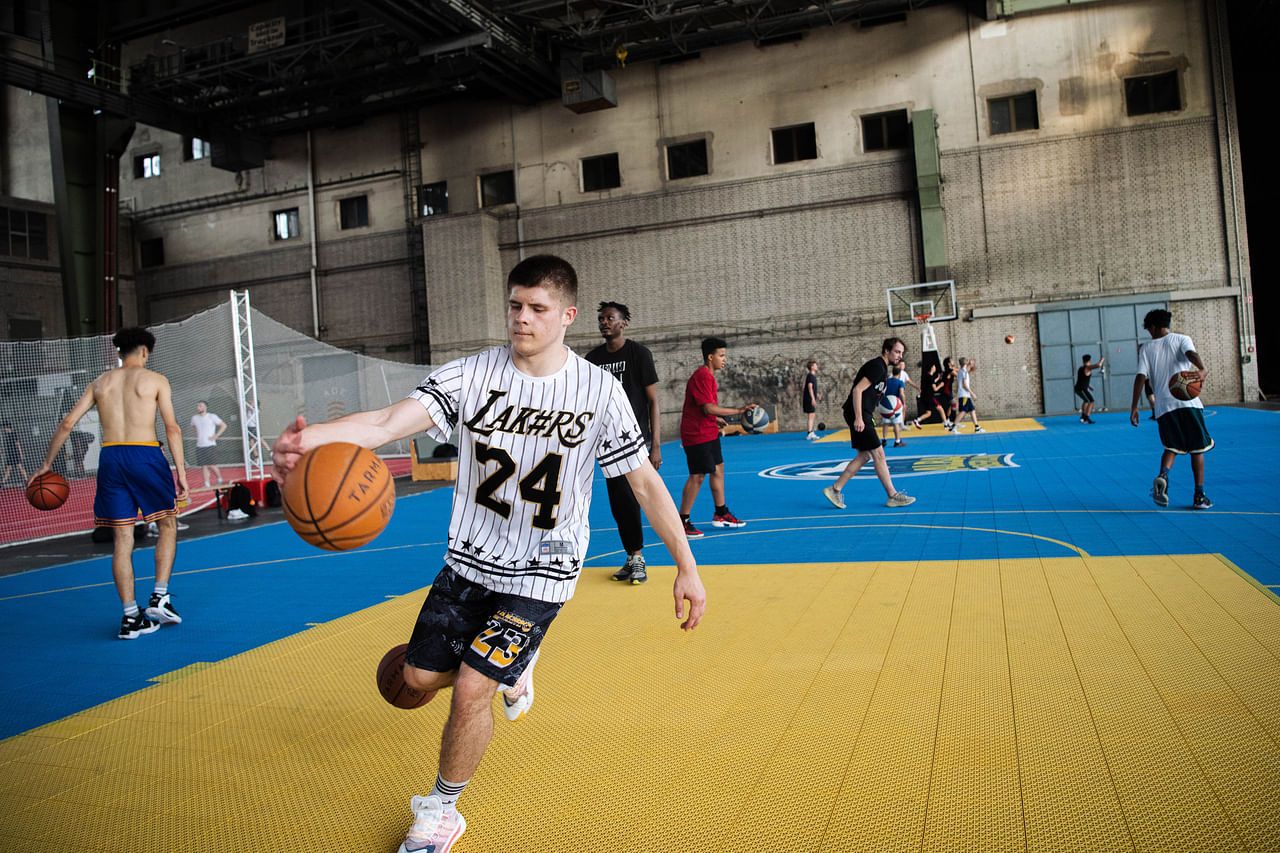An aircraft hangar in Berlin is 'second home' connecting refugees through sport
Sign up now: Get the biggest sports news in your inbox
Jeremiah Ong
Follow topic:
BERLIN - The sprawling interior of the defunct Tempelhof aircraft hangars in south Berlin was where Syrian football trainer Ali Al Omar Al Mashlab, 29, first called home when he touched down in the German capital.
In 2015, at its peak capacity, Ali shared the space with 2,500 other refugees, mostly from Syria and Iraq.
Seven years on, one of the hangars has been transformed into a 6,000 square metre hub for refugees and locals to participate in free sports activities and classes. Named Hangar1, the project was started by non-governmental organisation Tentaja in 2017.
Hangar1 director Niki Lampadius, 40, said the idea was to have a space where refugees could socialise.
"The plan was to use sports as an easy gateway for refugees to engage with each other and make meaningful connections," she added.
And in 2018, the space was opened to the local community so refugees could integrate better.
Now, Hangar1 sees approximately 4,000 visitors every month.
"We want everyone who comes by to feel comfortable and not feel conscious about their background, regardless of their citizenship status, gender identity and race," Lampadius said.
Tentaja is also working on a project to gather donations for Ukrainians affected by Russia's invasion. The initiative is called Spendenbrucke, which translates to "donation bridge", draws parallels to Tempelhof Airport's role during the 1948 Berlin Airlift, where supplies were delivered to people of west Berlin.
Now, part of Hangar1 has been repurposed as a temporary warehouse to store supplies and donations before they are shipped to Ukraine and key arrival locations like Tegel airport and Berlin central station.
Together with colleague and compatriot Abdulrahman Sammar, 28, Ali has been helping with managing logistics in the warehouse.
Both arrived in Germany in 2015 but first met at the state sports association, Landessportbund Berlin, where they were training for their coaching certification. The two reunited at Hangar1 by coincidence when Abdulrahman joined in 2019 as a taekwondo instructor, a year after Ali.
For Abdulrahman, working here allowed him to meet many who shared the same tongue in a foreign country. He conducts a weekly taekwondo class with students aged 16 to 24, including some from Afghanistan, Syria and Turkey.
"When I meet people from my country, I feel good speaking Arabic with them," he said.
"Being a trainer here feels like everything I enjoy coming together. As a sportsman, having a large sports hall and being able to interact with different people is perfect."

Through an initiative that reaches out to refugees under 18, Ali met Abdul Passit, 16, a fellow Syrian who had been in Germany for five months.
The aspiring football player joined Ali's class of 20 students and those two hours were enough to convince him to return.
He said: "I have played football since young and finding a place like this in Berlin makes me feel like I am reborn. Before this, I was just sitting at home eating and sleeping," he said.
Abdul's biggest takeaway? Learning three new German words from his new-found teammates.
Ali added: "Sport makes everything easier; you don't need to speak the same language to play."
It was Hangar1's charm that intrigued Ukrainian exchange student Lev Zolotukhin, 18, who fled to Berlin in March.
"I was playing basketball in Rudow and met a Turkish friend there who invited me to come here to play on his birthday. My birthday was a day before him, so it was like a present," the business administration student said.
Another plus was meeting skilful players as it not only allowed Zolotukhin to make new friends, but get better at the sport.
Hangar1's goal is to contribute to a "strong and inclusive society".

Lampadius said: "We are getting good feedback from the government. In a city like Berlin, we need a big space like this to let people interact and engage rather than coop up in their homes. If people are not integrated, it is bad for all parties."
Noting that Hangar1 is run by a team of 15, she added: "Some have lived here in the beginning and now are working here full-time, and that growth is very positive to see."
Seven years have passed since Ali arrived in Berlin's Tempelhof aircraft hangars; he no longer lives here but with a German family. But the memories of his stay remain.
He said: "It was tough in the beginning, but our suffering paved the way for the refugees who came after. Now, I can speak German and have my own job. I love the work I am doing; it is like my hobby."
"Hangar1 is my second home."
Jeremiah Ong is a final-year communication studies student at the Nanyang Technological University's Wee Kim Wee School of Communication and Information. His report on Hangar1 is part of the school's overseas reporting programme, Go-Far.

